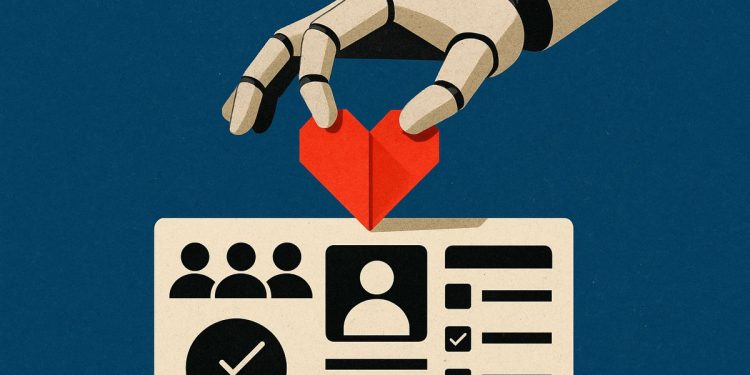Global HR teams are increasingly using AI for performance, mentorship, and work assignments, raising a critical question: can artificial intelligence manage people without dehumanizing them? As AI systems move from recruiting dashboards to core HR functions, the stakes are high. While algorithms can sharpen efficiency, they risk eroding empathy if deployed carelessly. However, emerging research shows that people-centric management can benefit from AI, provided organizations prioritize transparency, fairness, and human oversight.
From Annual Reviews to Minute-by-Minute Feedback
AI is transforming performance management by shifting from sporadic annual reviews to real-time, data-driven feedback. AI tools collect and analyze behavioral data, identifying patterns that managers might otherwise miss. A 2024 Chukwuka and Dibie study confirmed that these data-driven assessments boost both productivity and job satisfaction (PDF). Organizations using continuous feedback models report a 20-30% increase in review precision and a 25% reduction in evaluation cycle time.
AI performance tools automate data collection from multiple sources to provide continuous feedback and identify behavioral patterns. These systems translate raw metrics into objective coaching tips, goal suggestions, and performance alerts, enabling managers to focus on the quality of their conversations rather than on manual data entry.
Market adoption is accelerating. According to Worklytics, 75% of knowledge workers already use AI, and 78% of enterprises plan to implement AI performance software by 2025 (usage statistics). These tools empower managers by automating scoring and freeing up bandwidth for higher-quality, human-centric conversations.
Can Artificial Intelligence Manage Humans Without Dehumanizing Them? – The Mentorship Test
While mentorship traditionally relies on personal chemistry, generative AI is overcoming this barrier. By analyzing skills, career goals, and communication styles, AI now creates highly effective mentor matches and individualized learning journeys. A report from WhiteCrow Research highlights how this technology boosted employee engagement scores by 71 percent (WhiteCrow study).
Effective implementation, however, hinges on strong governance. Experts agree that keeping a human “in the loop” is essential for high-stakes decisions. Using explainable AI models, which show why a specific pairing was recommended, reinforces trust and helps mitigate hidden biases.
Guardrails: Ethics, Privacy, and Accountability
Without proper guardrails, AI algorithms can perpetuate and even amplify existing biases. Recognizing this risk, three-quarters of HR leaders named ethical AI oversight a top priority in SHRM’s 2024 Talent Trends survey. Effective governance programs typically feature three pillars:
- Cross-functional AI governance boards with clear escalation paths.
- Transparent data policies that define collection limits and retention.
- Regular audits to ensure AI outcomes align with fairness benchmarks.
Regulatory bodies are also taking action. Frameworks like the EU AI Act and UNESCO guidelines compel organizations to maintain transparent model logic, secure sensitive employee data, and ensure final accountability for decisions rests with humans, not algorithms.
Business Impact and Adoption Hurdles
The business case for AI in HR is compelling, with the performance management software market projected to more than double from $5.82 billion in 2024 to $12.17 billion by 2032. Early adopters already report significant returns, including 12.9% productivity gains and a 33% reduction in bias. However, adoption hurdles remain, as only 1% of firms describe their AI programs as “mature.” Common challenges include poor data infrastructure, inadequate change management, and managers’ fears of role erosion.
The rise of remote and hybrid work further accelerates the need for scalable management tools. AI helps by using predictive analytics to flag attrition risks and conversational agents to provide 24/7 policy support. Despite these efficiencies, leadership must ensure that AI-driven dashboards augment – not replace – essential human interactions like empathetic check-ins, recognition, and career development conversations.
Ultimately, evidence shows that AI excels at handling repetitive, data-intensive tasks, thereby freeing human managers to focus on empathetic engagement – a skill machines cannot replicate. Sustainable success with AI in HR depends on a commitment to transparent algorithms, vigilant auditing, and a workplace culture that values human connection.



















